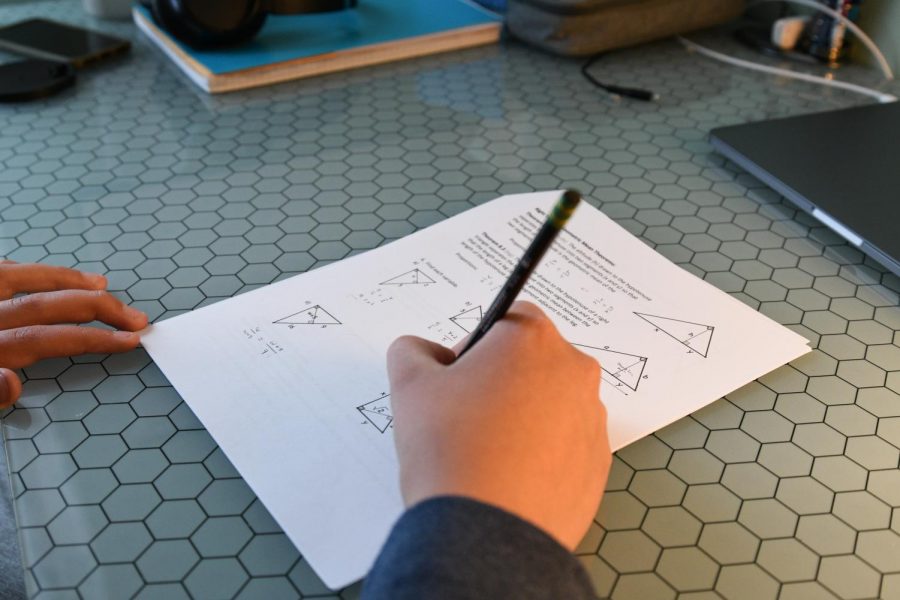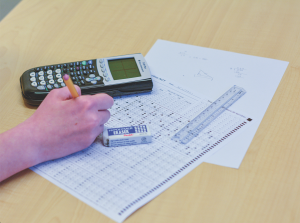Teachers cancel final exams, projects
Ninth grader Elena Bloom takes a math test for geometry class. While math is typically a subject heavily dependent on testing and finals, the traditional math final structure has been eliminated in many classes this year.
May 20, 2021
Spring and finals are often two words that come together at U-High. This year, however, as classes embark on the last stretch before summer, many teachers have decided to eliminate final exams and projects in response to social and academic changes inflicted by the pandemic and distance learning.
Math is typically a subject heavily dependent on testing and finals, but this year, the traditional math final structure has been eliminated in many classes.
Zana Tran and Farukh Khan decided to eliminate the final exam in their Precalculus/Intro to Calculus classes. Part of this choice had to do with complications of testing in hybrid learning — especially given that the class has had asynchronous testing all year.
“We are worried that it’s hard to have a fair final exam within this hybrid setting,” Ms. Tran said. “If we have a real-time exam, the students present in class will have a very different experience than those at home.”
Ms. Tran noted that teaching during distance learning required PCIC teachers to change their teaching plans in terms of how much material was covered — another factor that contributed to their decision.
“Because of COVID, we have been going slightly slower than other years. If we do not do a final exam, the time which would have been spent on reviewing for and administering it could be used to cover some more topics needed for calculus,” Ms. Tran said. “It’s harder to learn a new topic than to review, so we want to guide you through the new topics, and leave you to review on your own in the summer as needed.”
PCIC student James Sowerby appreciates the decision to eliminate a final exam.
“It takes the pressure off of memorization and grades and gives you a chance to focus more on the concepts and theory behind what you’re doing,” James said, “without worrying about consequences.”
Jane Canright, an AP Calculus BC teacher, also decided to eliminate the final because of time restraints.
“The final is usually in the format of a full AP test. That takes 3 hours and 15 minutes to administer, broken into specifically timed sections for the different sections of the test,” Ms. Canright said. “Even in regular school, this schedule is hard and takes a week of class.”
Other non-math classes have made similar decisions to eliminate final projects, not because of time restraints but based on student input. History teachers Christy Gerst and Christopher Janus, for example, have decided to eliminate the AT Modern European History EU Mock Council, a debate on current events where students represent different countries in the European Union.
“Mr. Janus and I have listened and responded to what the student body has shared all year about the lived experience of attending high school during a pandemic,” Ms. Gerst said. “We know the additional work hours of the EU Mock Council was not in students’ best interests.”
Kriti Sarav, a sophomore who has not had any final exams cancelled, said she wishes more of her teachers considered doing so.
“None of my classes eliminated finals unfortunately,” Kriti said. “I think they should for it to be more equitable, plus this year is already extremely stressful.”
While many students appreciate these changes, some, like junior Zach Gin, said taking finals can be a valuable experience because many were eliminated last year, too.
“Finals can be useful because it’s just a boost to your grade if you do well,” Zach said. “I think that not having finals two years in a row is going to detriment us in the long run.”
With this in mind, most teachers have made some adjustments to end of the year plans to find a balance between testing students’ knowledge and being mindful of what is in their best interest — something junior Peter Stern thinks is important.
“Finals can be hard on students’ mental health which has already been negatively impacted for most students due to the pandemic,” Peter said, “and so I think that even small changes are good.”
































































